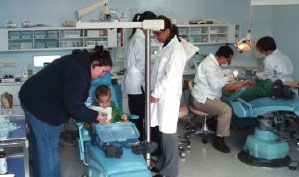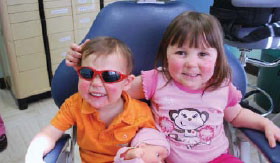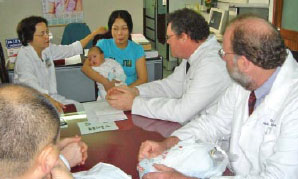Dalhousie University's faculty of dentistry recognizes that its efforts to improve access to oral care are part of a health movement that spans the private and public sectors and all health professions. Access to care, including dental access, is a complex and multi-dimensional issue that requires solutions which are just as varied and complex.1,2 Many people who are vulnerable to illness and health-related problems experience barriers to needed health care. The problem of inadequate oral health care exists here in Canada3-5 as well as in developing countries.
At Dalhousie's faculty of dentistry, increasing access to oral care begins on campus and extends beyond the school walls to the Nova Scotia community, to our provincial neighbours and internationally. The dean, Dr. Tom Boran, has taken up the theme of access to care as a way forward for the faculty:
The faculty has a good track record of outreach and attempting to help various vulnerable populations. We're also making progress helping to sensitize our students to the whole issue of access to care. We want to instill in students a desire to ask "What are the needs?" and "How can I make a difference?" We have to tackle access to care through research, service and teaching.
The faculty of dentistry has a long history of providing oral care for the public and of creating innovative and supportive partnerships to improve access to care. Some of the more recent initiatives involve forging communities of practice with dentists and others in the community. Each community of practice is a living curriculum for all who participate.6 Informal voluntary networks can yield educational opportunities with positive outcomes for students, patients and the community.7 These outreach and community coalitions may lead to new models of oral care that will help alleviate the increasing demands placed upon our current systems of oral care.8
 The clinic at Harbour View School, where dental and dental
hygiene students provide care under the supervision of a
pediatric dentist.
The clinic at Harbour View School, where dental and dental
hygiene students provide care under the supervision of a
pediatric dentist.
Communities of Practice at Home
The Halifax region has been the main focus of Dalhousie's faculty of dentistry efforts to enhance or expand oral care services. The various programs benefit schoolchildren, the elderly, new immigrants and those requiring urgent care, as well as the students and faculty who participate.
School-Based Dental ClinicsIt may not be one of the 3 Rs, but oral health is a top priority at 2 Halifax-area schools served by the faculty of dentistry. Students at Harbour View School, in inner-city Dartmouth, and Nelson Whynder Elementary School, in the largely African-Canadian community of North Preston, are treated at school-based clinics by undergraduate dental students who are supervised by a practising pediatric dentist. Dental hygiene students also provide care at Harbour View. The clinics operate 3 days a week during the school year and are ably supported by devoted faculty of dentistry staff volunteers. The schools were chosen (Harbour View in the early 1980s and Nelson Whynder in the mid-1990s) because of the socioeconomic vulnerability of the population in their catchment areas. Lower socioeconomic status is one of the key determinants of unmet oral health care needs. The members of the community and the principals of these schools are champions who recognize the issues and have partnered with Dalhousie to address them.
When we go to these schools, our students gain some of the best clinical experiences. Because we're taking the care out to the community and serving a population that might not otherwise have access to care, most of the children need a lot of work. —Dr. Ross Anderson, head, division of pediatric dentistry
The Dalhousie Dental Eldercare Clinic, which evolved from an outreach dental clinic founded in the early 1990s, is intended to care for frail older adults. Future dentists and hygienists work together much like they would in private practice. Through consultations and referrals, the patients have access to specialists, including oral surgeons and prosthodontists. Providing care for these patients takes extra time as many are typically over 75 years of age, take multiple medications and often have mobility problems or are mildly cognitively impaired.
[The Eldercare Clinic] provides our students the experience of working with patients who have high needs arising from frailty, complicated medical histories or disabilities, in an environment where there is a lot of support. The patients benefit from having access to a clinic where their special needs are accommodated. —Dr. Mary McNally, associate professor and supervisor, Eldercare Clinic
For people living in countries plagued by war, famine and disease, oral health may be low on their priority list. When these people arrive in Canada, their poor oral health often continues, in part because of language barriers, cultural differences or financial hardship. A new program involving second-year students in Dalhousie's School of Dental Hygiene is helping to address this problem. In 2009, students began treating patients of the Halifax Refugee Clinic.
There can be a communication barrier, depending on the immigrant's language. They may have had very limited access to dental care … just going to a dental office may involve a learning curve. For dental hygiene students, it's an opportunity to work with patients who have more challenging needs because they've not seen a dentist regularly, or at all. —Professor Nancy Neish, director, School of Dental Hygiene
Future dentists are now doing their part to help refugees as well. Dr. April Nason of the department of dental clinical sciences has started a pilot program that matches clients from the clinic with fourth-year students from the faculty of dentistry. Her long-term goal is to establish similar connections with local halfway houses, women's shelters and Halifax's homeless population, and to have the rotation become a mandatory part of the curriculum.
Emergency Dental ClinicsDr. Nason and her colleague Dr. Chris Lee manage a student on-call service for after-hours dental emergencies. Two students are responsible for contacting people who call the service, reviewing the case with the dentist on call and deciding on the next steps. The clinic is primarily intended for people who don't have their own dentist.
One of the most stressful things is to have people who are in pain come into your office in the middle of a fully booked day. Learning how to manage that in a timely manner and getting your patients out of pain, which I feel is probably one of the most important things we can do as dentists, is what we're trying to impress upon the students. —Dr. Chris Lee, assistant professor and emergency clinic manager
The students have also begun to treat hospital patients awaiting liver, kidney or heart transplants. "You have to have the skills not only to deal with emergencies, but to comfort patients and make sure they understand what's happening," notes Dr. Lee.
General Practice ResidencyDr. Lee is also spearheading a proposed new General Practice Residency at the faculty of dentistry to expose residents not just to hospital dentistry but to dentistry for medically compromised patients. Such a program may help fill the void for adult patients who can no longer obtain special care at the IWK (Children's) Health Centre once they are over the age of eligibility.
Residents will learn from and work with oral surgeons, periodontists, endodontists and prosthodontists, as well as other experts. The residency is projected to begin in 2011 as a university-based clinic with access for hospital patients. Although similar programs exist across Canada, Dalhousie's will be the first located east of Montreal. Patients will include those with head and neck cancers, bone-marrow transplant recipients and people suffering from leukemia.
 Two young patients at the dental clinic in Hopedale,
Labrador, in April 2009.
Two young patients at the dental clinic in Hopedale,
Labrador, in April 2009.
Dr. Joanne Clovis gives first-year dental students and second-year dental hygiene students an introduction to the promotion of oral health and the prevention of oral diseases. "An approach based on promotion and prevention aims to improve health status and to reduce health inequities among population groups," says Dr. Clovis. For dental hygiene students, field and extramural placements help to reinforce the concepts learned in the classroom and to facilitate meaningful relationships in the community. Each year, senior dental hygiene students provide instruction in oral health to children in approximately 50 elementary school classrooms, most in inner-city or lower socioeconomic areas of Halifax. The students also provide in-service oral health care and instruction to approximately 50 groups of seniors or their care providers in drop-in centres, collective living residences and long-term care facilities in Halifax. To reach the general public, the students design mall displays targeted to different age and social groups in Halifax. The oral health topics derive from student table clinics that are converted to public messages using health literacy principles.
Communities of Practice Out of Province
Labrador-Grenfell Externship ProgramThe Dalhousie faculty of dentistry is also making its mark elsewhere in Canada. Since 1988, the School of Dental Hygiene has run an externship program with the Labrador-Grenfell Health Authority in northern Newfoundland. Each year, 6 to 10 fourth-year dental hygiene students do a 2-week rotation in 1 of 4 communities: St. Anthony, Flower's Cove and Roddickton in Newfoundland, and Forteau in Labrador. Students improve their skills while helping patients who have long suffered from a dearth of dental hygiene services.
The students get a clinical experience that is just generally not available in Halifax. They typically see more difficult patients and a wider range of oral conditions, and they work in more isolated communities with a different population. —Dr. Joanne Clovis, coordinator, Labrador-Grenfell externship program
The students usually participate in preventive programs at schools and in the community, work with a community health nurse and observe dental surgery in a hospital setting. They also benefit from sharing ideas and experiences with medical, nursing and physiotherapy students who are performing rotations in the area.
Labrador LocumsFarther up the coast in Labrador, part-time faculty member Dr. Frances Tompkins has been working with the Nunatsiavut government for the past few years to provide essential dental care to residents of 2 of the 5 northern Inuit communities. Dr. Tompkins, who travels to the area every 5 weeks for 7 to 11 days each time, works with an assistant and a hygienist.
Given the daily challenges facing Dr. Tompkins' patients (isolation, extreme weather conditions, unemployment and poverty), oral health is not necessarily a top priority for them. The dental clinic, located within a local health centre, is open every day during her stay. Dr. Tompkins has seen some frightening and sad cases—a 3-year-old whose every tooth was decayed to the gum line, and one man who had begun performing his own root canals when the area had no dental service. The challenges in treating these patients are enormous, but the results are apparent—and rewarding.
Communities of Practice Far from Home
International Cleft Palate Missions
 Drs. David Precious and Reginald Goodday discuss the surgical
care of a young child with their Vietnamese colleague Dr. Viet.
Drs. David Precious and Reginald Goodday discuss the surgical
care of a young child with their Vietnamese colleague Dr. Viet.
Further afield, Dalhousie's international cleft palate missions provide corrective surgery to patients who likely wouldn't otherwise receive this type of care in countries such as Vietnam and Tunisia. Part of the mission focuses on imparting knowledge to local surgeons. The results of surgery can have a dramatic impact on a patient's oral function, self-esteem and development.
These missions were initiated in the mid-1990s by Dr. David Precious, professor of oral and maxillofacial sciences and dean emeritus of the faculty of dentistry. Each year, faculty members from the department of oral and maxillofacial surgery volunteer for a 10- to 16-day mission that sees them treating up to 70 children, teens and adults with cleft lip and palate deformities.
International Tanzania Study TourThe faculty of dentistry's International Tanzania Study Tour is a noncredit program for medical, dental, nursing and pharmacy students that takes place each summer in this East African country. The experience provides opportunities to learn how practitioners can work together to provide comprehensive care to patients. Participants also volunteer a week of their time with an NGO of their choice.
Dr. Murielle Arsenault, now finishing her pediatric general practice residency at the IWK Health Centre, took part in the study tour in 2008. She and her fellow students spent a week at Muhimbili National Hospital in Dar es Salaam, and a week at a small charity hospital in rural Ifakara. One recent graduate who took part in the program was surprised at the sheer lack of resources. The trip solidified her desire to work in Canada's North to provide care to remote communities.
Conclusion
Many people worldwide have extremely limited access to oral health care, if any at all. Even in Canada, there is a growing segment of the population that doesn't have the ability to afford even basic oral care. Rectifying this problem—in small or large ways—is the responsibility of every oral health care practitioner. With Dean Boran's leadership, Dalhousie's faculty of dentistry has made a commitment to improving access to oral care through partnerships and collaborations with dentists and others in our immediate and more distant communities. It is up to members of the profession to inform governments and the public about the important contribution of oral health to overall health. Our successes with these communities of practice bode well for the future.
THE AUTHORS
References
- Burt BA. Dentistry, dental practice, and the community. 6th ed. Philadelphia: WB Saunders; 2005.
- Edelstein BL. Forward. Dental access: a multifaceted problem. Dent Clin North Am. 2009;53(3):xi–xiii.
- Leake JL. Access and care: reports from Canadian dental education and care agencies. J Can Dent Assoc. 2005;71(7):469-71.
- Dean A. The ability and the will (President's column). J Can Dent Assoc. 2004;70(9):589.
- Main P, Leake J, Burman D. Oral health care in Canada--a view from the trenches. J Can Dent Assoc. 2006;72(4):319. Available: www.cda-adc.ca/jcda/vol-72/issue-4/319.html.
- Wenger E. Communities of practice: learning, meaning and identity. Cambridge, UK: Cambridge University Press; 2003.
- O'Keefe J. Time for new models of care (editorial). J Can Dent Assoc. 2008;74(6):481.
- Li LC, Grimshaw JM, Nielsen C, Judd M, Coyte PC, Graham ID. Use of communities of practice in business and health care sectors: a systematic review. Implement Sci. 2009;4:27.
